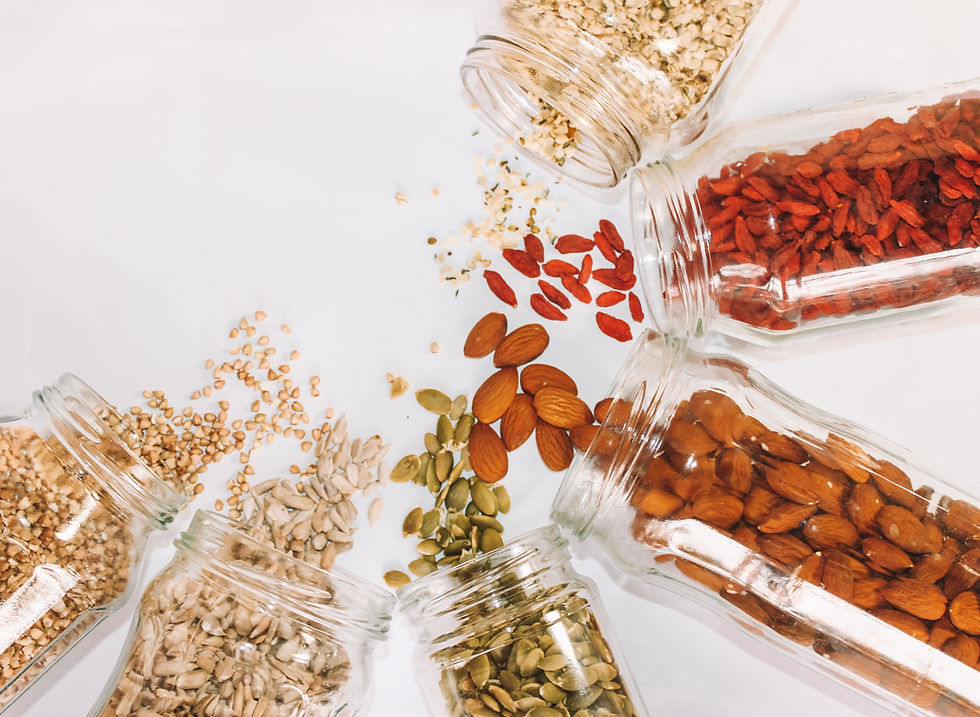Green Tea: The Natural Elixir for Inflammation Control
- Chelsea Birch, ND, RH (AHG), CBHT

- Oct 22, 2021
- 3 min read
Updated: Feb 10, 2025
In this complex world of 1001 supplements and diet plans, I tend to appreciate simplicity more and more. Today, we're going to keep things simple. If I could recommend ONE thing for inflammation control, it's 3 cups of tea per day. Green tea.
Let's put green tea in the spotlight. Did you know that studies show green tea is effective for:
Preventing arthritis
Protecting the body during chemotherapy
Reducing lung inflammation (hello COPD and asthma)
Decreasing flares in irritable bowel syndromes
Calming gingivitis
Decreasing the risk of liver, stomach, bladder, kidney, esophageal, lung, and pancreatic cancers
Mitigating the risk of strokes and heart attacks

I know the component of green tea called EGCG has gotten a lot of attention these days, but that's just ONE of the many components that can be extracted from green tea. As a Naturopathic Doctor and Herbalist, I prefer to use the whole plant for synergistic effects. Here's why:
Green tea contains multiple components that work together for your best health. For example caffeine promotes alertness and acts as a mild diuretic, saponins contain anti-viral properties, L-Theanine is a naturally occurring amino acid that promotes a calming sensation and helps lower blood pressure, and Vitamin C helps with collagen formation and antioxidant actions.
It's the beautiful WHOLE combination of green tea the produces the ultimate effect.
What about matcha? Matcha is a finely ground version of green tea that contains higher doses of antioxidants than your average green tea bag. But for those sensitive to caffeine, I'd recommend staying away from matcha due to its high caffeine content. For those on the matcha train, make sure that you're getting it from a trustworthy seller as many sources contain heavy metals.
I encourage you to keep it simple. Steep green tea daily rather than buying pills. Enjoy a warm cup with a friend or sip on a mason jar of chilled green tea in the summertime. And if you're on a budget, try the re-steep method to stretch your natural medicine just a bit further.
If you're up for a challenge: Drink 3 cups of green tea every day for a week and let us know how you feel on day 7. I have no doubt you'll feel calm as a cucumber and more alert than you have in years.
At IVY Integrative, you can work with one practitioner or build your own team of holistic practitioners! Reach your optimum health in-person or online. Check out our Get Started page to learn how to work with us!
Until next time,
References:
Basu, A., & Lucas, E. A. (2007). Mechanisms and effects of green tea on cardiovascular health. Nutrition reviews, 65(8), 361-375.
Bushman, J. L. (1998). Green tea and cancer in humans: a review of the literature. Nutrition and cancer, 31(3), 151-159. Chicago
Donà, M., Dell’Aica, I., Calabrese, F., Benelli, R., Morini, M., Albini, A., & Garbisa, S. (2003). Neutrophil restraint by green tea: inhibition of inflammation, associated angiogenesis, and pulmonary fibrosis. The Journal of Immunology, 170(8), 4335-4341.
Krahwinkel, T., & Willershausen, B. (2000). The effect of sugar-free green tea chew candies on the degree of inflammation of the gingiva. Eur J Med Res, 5(11), 463-7.Chicago
Li, Y., Chang, S. C., Goldstein, B. Y., Scheider, W. L., Cai, L., You, N. C. Y., ... & Mu, L. (2011). Green tea consumption, inflammation and the risk of primary hepatocellular carcinoma in a Chinese population. Cancer epidemiology, 35(4), 362-368.
Singh, R., Akhtar, N., & Haqqi, T. M. (2010). Green tea polyphenol epigallocatechi3-gallate: Inflammation and arthritis. Life sciences, 86(25-26), 907-918.
Varilek, G. W., Yang, F., Lee, E. Y., DeVilliers, W. J., Zhong, J., Oz, H. S., ... & McClain, C. J. (2001). Green tea polyphenol extract attenuates inflammation in interleukin-2–deficient mice, a model of autoimmunity. The Journal of nutrition, 131(7), 2034-2039.
Disclaimer:
This information is generalized and intended for educational purposes only. Due to potential individual contraindications, please see your primary care provider before implementing any strategies in these posts.



